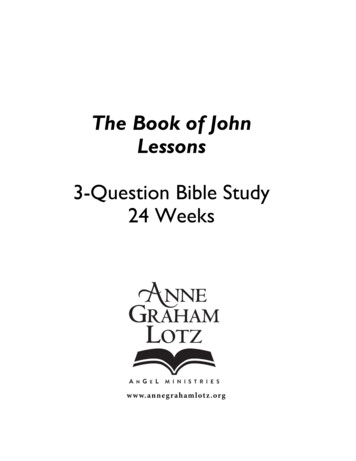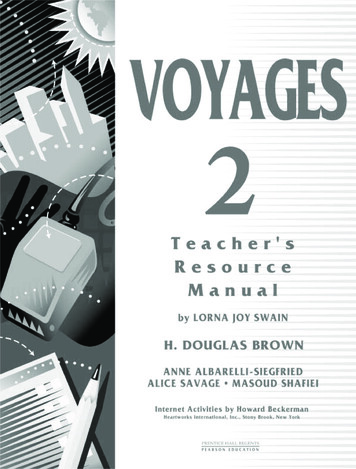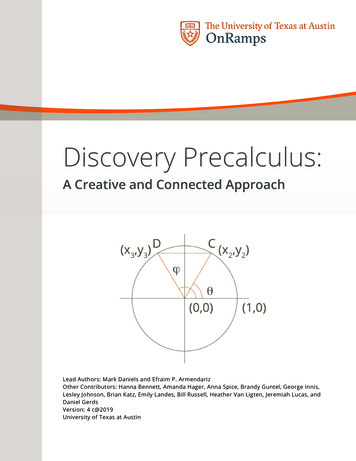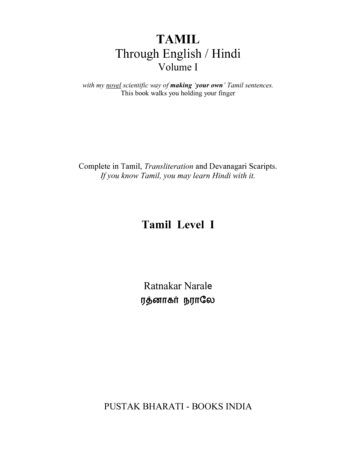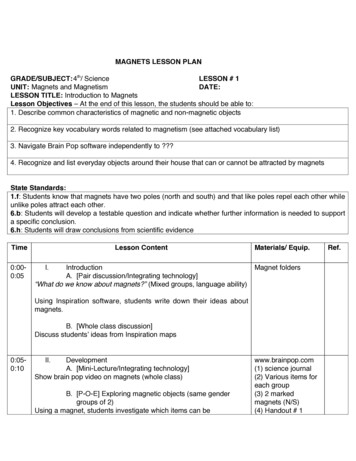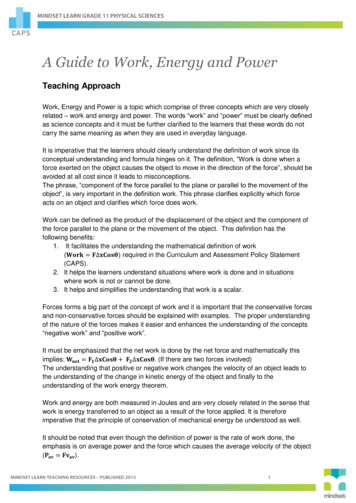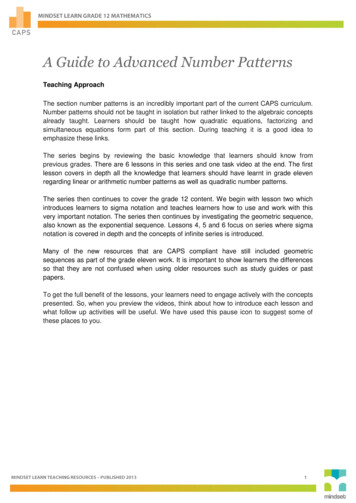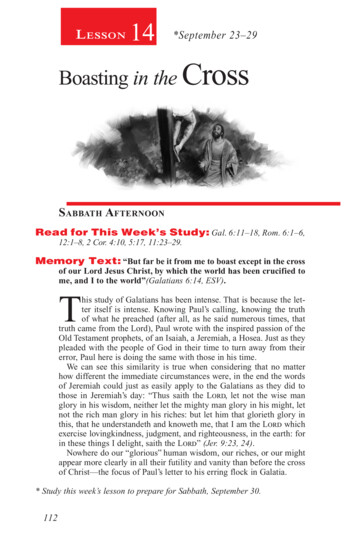
Transcription
L esson14*September 23–29Boasting in the CrossSabbath AfternoonRead for This Week’s Study: Gal. 6:11–18, Rom. 6:1–6,12:1–8, 2 Cor. 4:10, 5:17, 11:23–29.Memory Text: “But far be it from me to boast except in the crossof our Lord Jesus Christ, by which the world has been crucified tome, and I to the world”(Galatians 6:14, ESV).This study of Galatians has been intense. That is because the letter itself is intense. Knowing Paul’s calling, knowing the truthof what he preached (after all, as he said numerous times, thattruth came from the Lord), Paul wrote with the inspired passion of theOld Testament prophets, of an Isaiah, a Jeremiah, a Hosea. Just as theypleaded with the people of God in their time to turn away from theirerror, Paul here is doing the same with those in his time.We can see this similarity is true when considering that no matterhow different the immediate circumstances were, in the end the wordsof Jeremiah could just as easily apply to the Galatians as they did tothose in Jeremiah’s day: “Thus saith the Lord, let not the wise manglory in his wisdom, neither let the mighty man glory in his might, letnot the rich man glory in his riches: but let him that glorieth glory inthis, that he understandeth and knoweth me, that I am the Lord whichexercise lovingkindness, judgment, and righteousness, in the earth: forin these things I delight, saith the Lord” (Jer. 9:23, 24).Nowhere do our “glorious” human wisdom, our riches, or our mightappear more clearly in all their futility and vanity than before the crossof Christ—the focus of Paul’s letter to his erring flock in Galatia.* Study this week’s lesson to prepare for Sabbath, September 30.112
S unday September 24Paul’s Own HandCompare Paul’s closing remarks in Galatians 6:11–18 to the finalremarks he makes in his other letters. In what way is the ending ofGalatians similar to and different from them? (See the final remarksin Romans, 1 and 2 Corinthians, Ephesians, Philippians, Colossians,and 1 and 2 Thessalonians.)Paul’s closing remarks are not always uniform, but a number of common elements appear in them: (1) greetings to specific individuals, (2)a final exhortation, (3) a personal signature, and (4) a closing benediction. When these typical features are compared to Paul’s final remarksin Galatians, two significant differences appear.First, unlike many of Paul’s letters, Galatians contains no personalgreetings. Why? As with the absence of the traditional thanksgiving atthe beginning of the letter, this is probably a further indication of thestrained relationship between Paul and the Galatians. Paul is polite butformal.Second, we must remember that it was Paul’s custom to dictate hisletters to a scribe (Rom. 16:22). Then, after finishing, Paul often wouldtake the pen himself and write a few brief words with his own handto end the letter (1 Cor. 16:21). In Galatians, however, Paul deviatesfrom his practice. When he takes the pen from the scribe, Paul is stillso concerned with the circumstances in Galatia that he ends up writingmore instead. He simply cannot put the pen down until he pleads withthe Galatians once more to turn from their foolish ways.In Galatians 6:11 Paul stresses that he wrote the letter with largeletters. We really don’t know why. Some have speculated that Paul wasnot referring to the size of the letters but to their misshaped form. Theysuggest that perhaps Paul’s hands were either so crippled from persecution or gnarled from tent making that he could not form his letters withprecision. Others believe his comments provide further evidence of hispoor eyesight. Though both views are possible, it seems far less speculative to conclude simply that Paul was intentionally writing with largeletters in order to underscore and reemphasize his point, similar to theway we might emphasize an important word or concept by underliningit, putting it in italics, or writing it in CAPITAL LETTERS.Whatever the reason, Paul certainly wanted the readers to heed hiswarning and admonitions.113
M onday September 25Boasting in the FleshRead Galatians 6:12, 13. What is Paul saying in these verses?Although Paul has hinted previously about the agenda and motivationof his opponents (see Gal. 1:7, 4:17), his remarks in Galatians 6:12,13 are the first explicit comments he makes about his opponents. Hedescribes them as wanting “to make a good showing in the flesh” (ESV).The phrase “a good showing” in Greek literally means to put on “a goodface.” In fact, the word for “face” is the same in Greek as the word foran actor’s mask, and this word was even used figuratively to refer to therole played by an actor. In other words, Paul is saying that these peoplewere like actors seeking the approval of an audience. In a culture basedon honor and shame, conformity was essential. Those teaching the errorsappear to have been seeking to improve their own honor rating as a display for their fellow Jews in Galatia and other Jewish Christians back inJerusalem.Paul makes an important point about one of their motives: the desireto avoid persecution. Though persecution can certainly be understoodin its more dramatic forms involving physical abuse, it can be just asdamaging even in its more “mild” forms of harassment and exclusion.Paul and other fanatical zealots in Judea had once carried out the former type (Gal. 1:13), but the latter also had its effect on Christians.The Jewish religious leaders had significant political influence inmany areas. They had the official sanction of Rome; hence, many Jewishbelievers were eager to maintain good relations with them. By circumcising Gentiles and teaching them to observe the torah, the troublemakersin Galatia could find a point of common ground with the local Jews. Notonly would this allow the troublemakers to maintain friendly contact withthe synagogues, but they could even strengthen their ties with the Jewishbelievers in Jerusalem who had a growing suspicion about the workbeing done with the Gentiles (Acts 21:20, 21). No doubt, too, all theseacts could have made their witness to the Jews more effective.Whatever situation Paul has in mind, his meaning is clear: “All thatwill live godly in Christ Jesus shall suffer persecution” (2 Tim. 3:12).Think through the reason these people had for teaching theirerrors. It sounds pretty reasonable, all things considered. Whatshould this tell us about how even the “best” of motives can leadus astray if we aren’t careful? When was the last time you endedup doing wrong things for the right motives?114
T uesday September 26Boasting in the Cross (Gal. 6:14)“But God forbid that I should glory, save in the cross of our LordJesus Christ, by whom the world is crucified unto me, and I untothe world” (Gal. 6:14).Having exposed the motives that prompted some to insist on circumcision, Paul presents his gospel message to the Galatians one finaltime, though only in summary form. For Paul, the gospel is based ontwo fundamental tenets: (1) the centrality of the Cross (Gal. 6:14) and(2) the doctrine of justification (Gal. 6:15). In today’s study the focusis on the former.Because we live in the twenty-first century, it is difficult for us tocomprehend the shock that Paul’s comments about the Cross (Gal.6:14) originally conveyed. Today the cross of Christ is a commonand cherished symbol that evokes positive feelings for most people.In Paul’s day, however, the Cross was not something to boast in butsomething to be despised. Jews found the idea of a crucified Messiahoffensive, and Romans found crucifixion so repulsive that it was noteven mentioned as a form of punishment suitable for a Roman citizen.The contempt with which the ancient world looked upon the crossof Christ is clearly seen in the earliest drawing of the crucifixion onrecord. Dating back to the early second century, a piece of ancient graffiti depicts the crucifixion of a man with the head of a donkey. Belowthe cross and adjacent to a drawing of a man with his hands raised inworship, an inscription reads, “Alexander worships his god.” The pointis clear: the cross of Christ is deemed ridiculous. It is in this contextthat Paul boldly declares that he can boast in nothing other than thecross of Christ!What difference did the cross of Christ make in Paul’s relationship tothe world? Gal. 6:14, Rom. 6:1–6, 12:1–8, Phil. 3:8.The cross of Christ changes everything for the believer. It challengesus not only to reevaluate how we view ourselves but also how we relate tothe world. The world—this present evil age and all that it entails (1 John2:16)—stands in opposition to God. Because we have died with Christ,the world no longer has the enslaving power it once held over us, and theold life that we once lived for the world is no longer. Following Paul’sanalogy, the break between the believer and the world should be as ifthe two died to each other.What has the Cross done to affect your relationship to the world?What difference has it made in your life? How differently do youlive now than you did before giving yourself to the Lord, whodied for you?115
W ednesday September 27A New CreationHaving emphasized the centrality of the cross of Christ to theChristian life, Paul now emphasizes the second fundamental tenet ofhis gospel message: justification by faith.As we have seen all quarter, Paul has basically pitted circumcisionagainst the gospel. Yet, he’s not against the practice itself. Paul hasmade several strong statements against circumcision (see Gal. 5:2–4),but he does not want the Galatians to conclude that being uncircumcised is more pleasing to God than being circumcised. That is not hispoint, because one can be just as legalistic about what one does asabout what one doesn’t do. Spiritually speaking, the issue of circumcision by itself is irrelevant. True religion is not rooted in external behavior but in the condition of the human heart. As Jesus Himself said, aperson can look wonderful on the outside but be spiritually rotten onthe inside (Matt. 23:27).What does it mean to be a new creation? Gal. 6:15, 2 Cor. 5:17. Howhave you yourself experienced what this means?Ktisis is the Greek word translated “creation.” It can refer either to anindividual “creature” (Heb. 4:13) or to all of the “created” order itself(Rom. 8:22). In either case, the word implies the action of a Creator.This is Paul’s point. Becoming a “new creature” is not something thatcan be brought about by any human effort—whether by circumcision or anything else. Jesus refers to this process as the “new birth”(John 3:5–8). It is the divine act in which God takes a person who isspiritually dead and breathes spiritual life into him. This is yet anothermetaphor to describe the saving act that Paul typically describes asjustification by faith.Paul refers to this new creation experience in detail in 2 Corinthians 5:17. In this verse, Paul explains that becoming a new creationmeans more than just a change in our status in the books of heaven; itbrings about a change in our everyday lives. As Timothy George notes,it “involves the whole process of conversion: the regenerating work ofthe Holy Spirit leading to repentance and faith, the daily process ofmortification and vivification, continual growth in holiness leading toeventual conformity to the image of Christ.”—Galatians, p. 438.Becoming a new creature, however, is not what justifies us. This radical change is, instead, the unmistakable manifestation of what it meansto be justified.116
T hursday September 28Final Remarks (Gal. 6:16–18)Paul bestows his blessing on those who, he says, “follow this rule” (Gal.6:16, NIV, NRSV). Given the context, what “rule” do you think Paulis talking about?The word translated as “rule” literally refers to a straight rod or barused by masons or carpenters for measuring. The word eventually tookon a figurative meaning referring to the rules or standards by whicha person evaluates something. For example, when people talk aboutthe New Testament canon, they are referring to the 27 books in theNew Testament, which are seen as authoritative for determining boththe belief and practice of the church. Therefore, if a teaching does not“measure up” to what is found in these books, it is not accepted.What are the “marks of the Lord Jesus” that Paul bears on his body?What does he mean when he writes that no one should “trouble”him because of them? Might Galatians 6:14 help answer this question? Gal. 6:17, 2 Cor. 4:10, 11:23–29.The word mark comes from the Greek word stigmata, from whichthe English word stigma also is derived. Paul may be referring to thecommon practice of the branding of slaves with the insignia of theirmaster as a form of identification or to the practice in some mysteryreligions where a devotee branded himself or herself as a sign of devotion. In any case, “by ‘the marks of the Lord Jesus’ Paul doubtlessrefers to the scars left upon his body by persecution and hardship (see2 Cor. 4:10, 11:24–27). His opponents now insist on compelling hisGentile converts to accept the mark of circumcision as a token of theirsubmission to Judaism. But Paul has marks that indicate whose slavehe has become, and for him there is no other loyalty than to Christ. . . .The scars Paul had received from his enemies while in the service ofhis Master spoke most eloquently of his devotion to Christ.”—The SDABible Commentary, vol. 6, p. 989 (italics added).What are the “marks,” physical or otherwise, that you havebecause of your faith in Jesus? In other words, what has yourfaith cost you?117
F riday September 29Further Thought: “The cross of Calvary challenges, and will finallyvanquish every earthly and hellish power. In the cross all influencecenters, and from it all influence goes forth. It is the great center ofattraction; for on it Christ gave up His life for the human race. Thissacrifice was offered for the purpose of restoring man to his originalperfection. Yea, more, it was offered to give him an entire transformation of character, making him more than a conqueror.“Those who in the strength of Christ overcome the great enemy ofGod and man, will occupy a position in the heavenly courts aboveangels who have never fallen.“Christ declares, ‘I, if I be lifted up from the earth, will draw allmen unto me.’ If the cross does not find an influence in its favor, itcreates an influence. Through generation succeeding generation, thetruth for this time is revealed as present truth. Christ on the cross wasthe medium whereby mercy and truth met together, and righteousnessand peace kissed each other. This is the means that is to move theworld (MS 56, 1899).”—Ellen G. White Comments, The SDA BibleCommentary, vol. 6, p. 1113.Discussion Questions: What significance do you find in the fact that Paul both beginsand ends his letter with reference to God’s grace? Compare Gal.1:3 and 6:18. In light of Paul’s statement about having been “crucified . . . tothe world” (Gal. 6:14), what relationship should Christians havewith the world today? How should Christians relate to issues dealing with the environment, racism, abortion, etc., if they have diedto the world? How does a person know if he or she has experienced the “newcreation” that Paul writes about? Based on what you have learned this quarter, how would yousummarize Paul’s views on the following topics: the law, works oflaw, justification by faith, the old and new covenants, the work ofChrist, and the nature of the Christian life?Summary: True religion does not consist of outward behavior alonebut in the condition of the heart. When the heart is surrendered to God,a person’s life will more and more reflect the character of Christ as heor she grows in faith. The heart must be subdued by Christ; when thathappens, all else will follow.118
Storyi n s i d eMatch Made in Heaven: Part 3“You should pray very hard about it,” Marina said. “This is a serioussituation.” Then Marina added a surprising comment. “Maybe I can helpyour parents to find an Adventist man. I know a few people.”“Would you really?” Sahana asked. “That would be wonderful.”Sahana spoke with her mother about her concerns. “Mother, I want tomarry an Adventist man.”“All these different churches are really the same,” her mother said.“And I don’t know any Adventist men.”“My friend Marina can help you to find an Adventist husband for me,”Sahana said.“Well, yes, if Marina has someone in mind, we will certainly considerhim,” her mother replied.Marina knew that Pastor Michael would be married soon. She knewthat many Adventist young people would come to his wedding. Marinalearned that Aby, a young man from some distance away was coming andwould stay with Marina and her family. She invited Sahana to meet thisyoung man in her home.Sahana prayed earnestly that God would lead her to a fine Adventistyoung man, and she felt the Holy Spirit’s assurance that He had heardher prayers.When the young man arrived, Sahana was pleased that he was so courteous—and handsome. She learned that he was a software engineer. Thetwo talked together in Marina’s home for several hours. Sahana’s parentsmet Aby and also were impressed by him.After the pastor’s wedding, Aby returned home, and Sahana did notspeak to him again. Two days later Aby’s mother requested a photo ofSahana. Two months later Aby’s parents met Sahana and her parents. Themeeting went well. When Aby’s parents returned home, his mother toldher son, “She is a dream girl, the girl I would choose for you.”Wedding arrangements began. When Sahana’s school contract ended,she was baptized—by Aby’s father. Three months later the couple wasmarried. Their wedding day marked the second time they had seen eachother, as is the custom in arranged marriages.Though they were all but strangers at their wedding, Sahana and Abyare convinced that God led them to each other. They have settled intoa life together with God as the center of their home and now have twochildren of their own.Aby and Sahana Kurian live in Hosur, India, where Aby is a softwareengineer.Produced by the General Conference Office of Adventist Mission.Web site: www.AdventistMission.org119
2017Bible Study Guide for the Fourth QuarterNext quarter we will study Romans for the ProtestantReformation’s five-hundredth anniversary. In 1517, Martin Lutherposted his 95 Theses. His act changed the world. Although muchhas changed, God’s Word hasn’t. Truth led Luther to challenge Romeand deliver to millions the great message of salvation by faith. Sincethen, Christianity has greatly advanced, freeing itself from centuries of false doctrine that usurped the gospel. Yet over time, theReformation stalled. In this ecumenical age, the truths that beganthe Reformation have been blurred to hide fundamental differencesthat have remained unresolved since Luther’s day. The propheciesof Daniel 7:23–25, 8:9–12, Revelation 13–14, and the message ofsalvation by faith show why faithful Bible students must adhereto the truths that our Protestant forefathers defended, even at thecost of their lives. We reject all attempts to draw Christians backto Rome. Scripture points in the opposite direction (Rev. 18:4), andwe proceed in that direction as we proclaim the gospel (Rev. 14:6).Lesson 1—The Apostle Paul in RomeThe Week at a Glance:Sunday: The Apostle Paul’s Letter (Rom. 16:1, 2)Monday: Paul’s Desire to Visit Rome (Rom. 15:20–27)Tuesday: Paul in Rome (Acts 28:16)Wednesday: The “Saints” in Rome (Rom. 1:7)Thursday: The Believers in Rome (Rom. 1:8)Memory Text—Romans 1:8, NKJVSabbath Gem: Paul’s words in Romans are as relevant to God’schurch today as they were in Paul’s day and in Martin Luther’s.Lesson 2—The ControversyThe Week at a Glance:Sunday: A Better Covenant (Heb. 8:6)Monday: Jewish Laws and Regulations (Leviticus 12, 16, 23)Tuesday: As the Custom of Moses (Acts 15:1–12)Wednesday: The Gentile Believers (Acts 15:5–29)Thursday: Paul and the Galatians (Gal. 1:1–12)Memory Text—John 1:7Sabbath Gem: Obedience to God’s moral law is as much partof the New Covenant as it is of the Old Covenant.Lessons for the Visually Impaired The regular Adult Sabbath SchoolBible Study Guide is available free each month in braille and on audio CD to sightimpaired and physically handicapped persons who cannot read normal ink print. Thisincludes individuals who, because of arthritis, multiple sclerosis, paralysis, accident,and so forth, cannot hold or focus on normal ink-print publications. Contact ChristianRecord Services for the Blind, Box 6097, Lincoln, NE 68506-0097. Phone: 402-4880981; e-mail: info@christianrecord.org; Web site: www.christianrecord.org.120
N O T E S121
This user-friendly devotional commentary divides the textof Galatians and Ephesians into bite-sized passages, usinga new translation by the author. Each passage is followedby an explanation that reveals themes and patterns, moving from exegesis to practical applicationin the lives of twenty-first-century believers.The format will prove helpful for churchstudy groups and midweek meetings,equipping the reader to understand betterGod’s message of transforming grace today.US 16.99ISBN 978-0-8280-1896-8For eBooks, go to:Adventist-eBooks.com 2017 Pacific Press Publishing AssociationPlease contact your ABCfor pricing in Canada.1655901708
N O T E S
Ellen G. WhiteThe Bible offersinformation andsolutions that havestood the test oftime. Drawing onthe Bible’s accounts,Story of Hope offersa glimpse behind history’s curtain.It reveals the origin of evil, some ofthe ways God has dealt with evil inthe past, and His plan for resolvingit completely in the near future.978-0-8280-2817-2 US 1.99Tamyra HorstIn sharing her personal journey with prayer, Tamyra Horst paints awondrous, awe-inspiring picture of a God who reveals His deep,unending love for each of us. Teach Us to Pray, the 2017 sharing bookfor women, is a precious gift to share with sisters, friends, coworkers,and family members. 978-0-8163-5848-9 US 2.99For eBooks, go to:Adventist-eBooks.com 2016 Pacific Press Publishing AssociationPlease contact your ABCfor pricing in Canada.1655901709
N O T E S
Aivars Ozolins, PhD, withElizabeth Viera Talbot, PhDRadical Discipleship studies the lives of thesetwelve flawed men who were purposelychosen for an unparalleled task. You willlearn how their lives were turned upsidedown by a God of EXTRA-ordinary grace,and how that EXTRA-ordinary grace isavailable to you today. Because He didn’tjust choose the twelve, He chose you too.And because when we receive the extraordinary grace of God, He ignites in us anuncontainable passion, which will spillinto every aspect of our lives. We will findour worth, identity, and purpose at the feetof Jesus. Now that’s radical!For eBooks, go to:Adventist-eBooks.com 2016 Pacific Press Publishing AssociationPlease contact your ABCfor pricing in Canada.1655901710978-0-8163-6160-1 US 2.99
N O T E S
12:1-8, 2 Cor. 4:10, 5:17, 11:23-29. Memory Text: "But far be it from me to boast except in the cross . of our Lord Jesus Christ, by which the world has been crucified to me, and I to the world" (Galatians 6:14, ESV). T. his study of Galatians has been intense. That is because the let-ter itself is intense. Knowing Paul's calling .
